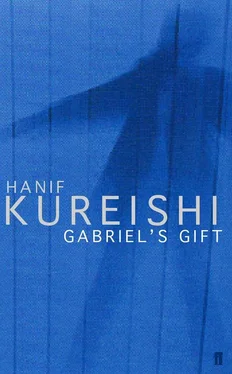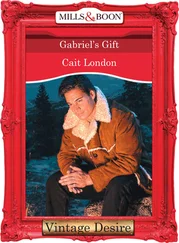Hanif Kureishi - Gabriel's Gift
Здесь есть возможность читать онлайн «Hanif Kureishi - Gabriel's Gift» весь текст электронной книги совершенно бесплатно (целиком полную версию без сокращений). В некоторых случаях можно слушать аудио, скачать через торрент в формате fb2 и присутствует краткое содержание. Год выпуска: 2001, ISBN: 2001, Издательство: Faber & Faber, Жанр: Современная проза, на английском языке. Описание произведения, (предисловие) а так же отзывы посетителей доступны на портале библиотеки ЛибКат.
- Название:Gabriel's Gift
- Автор:
- Издательство:Faber & Faber
- Жанр:
- Год:2001
- ISBN:9780571249428
- Рейтинг книги:5 / 5. Голосов: 1
-
Избранное:Добавить в избранное
- Отзывы:
-
Ваша оценка:
- 100
- 1
- 2
- 3
- 4
- 5
Gabriel's Gift: краткое содержание, описание и аннотация
Предлагаем к чтению аннотацию, описание, краткое содержание или предисловие (зависит от того, что написал сам автор книги «Gabriel's Gift»). Если вы не нашли необходимую информацию о книге — напишите в комментариях, мы постараемся отыскать её.
Gabriel's Gift — читать онлайн бесплатно полную книгу (весь текст) целиком
Ниже представлен текст книги, разбитый по страницам. Система сохранения места последней прочитанной страницы, позволяет с удобством читать онлайн бесплатно книгу «Gabriel's Gift», без необходимости каждый раз заново искать на чём Вы остановились. Поставьте закладку, и сможете в любой момент перейти на страницу, на которой закончили чтение.
Интервал:
Закладка:
Hanif Kureishi
Gabriel's Gift
For Kier
Chapter One
‘School — how was, today?’
‘Learning makes me feel ignorant,’ said Gabriel. ‘Has Dad rung?’
As well as the fact he didn’t know where his father was, something strange was happening to the weather in Gabriel’s neighbourhood. That morning, when he left for school with Hannah, there was a light spring shower, and it was autumn.
By the time they had reached the school gates, a layer of snow sat on their hats. At lunch-time in the playground, the hot floodlight of the sun — suddenly illuminated like a lamp — had been so bright the kids played in shirtsleeves.
In the late afternoon, when he and Hannah were hurrying home along the edge of the park, Gabriel became certain that the leaves in the park were being plucked from the ground and fluttered back to the trees from which they had fallen, before turning green again.
From the corner of his eye, Gabriel noticed something even odder.
A row of daffodils were lifting their heads and dropping them like bowing ballerinas at the end of a performance. When one of them winked, Gabriel looked around before gripping Hannah’s hairy hand, something he had always been reluctant to do, particularly if a friend might see him. But today was different: the world was losing its mind.
‘Has he been in touch?’ Gabriel asked.
Hannah was the foreign au pair.
‘Who?’ she said.
‘My father.’
‘Certainly no. Gone away! Gone!’
Gabriel’s father had left home, at Mum’s instigation, three months ago. Unusually, it had been several days since he had phoned, and at least two weeks since Gabriel had seen him.
Gabriel determined that as soon as they got back he would make a drawing of the winking daffodil, to remind him to tell his father about it. Dad loved to sing, or recite poetry. ‘Fair daffodils, we weep to see / You haste away so soon …’ he would chant as they walked.
For Dad the shops, pavements and people were alive like nature, though with more human interest, and as ever-changing as trees, water or the sky.
In contrast, Hannah looked straight ahead, as if she were walking in a cupboard. She understood little English and when Gabriel spoke to her she grimaced and frowned like someone trying to swallow an ashtray. Perhaps they were both amazed that a kid spoke better English than she did.
Although Gabriel was fifteen, until recently his father had usually walked him home from school in order to keep him away from any possible temptations and diversions. Not long ago Dad had had to rescue Gabriel from a dangerous scene in a nearby block of flats. Fortunately Dad was a musician and often had spare time during the day; too much spare time, said Gabriel’s mother, who had started to find Rex himself somewhat ‘spare’. Going to the school had been the only ‘structure’ Dad had, apart from his daily visits to the pub, where several of the other parents also considered the world through the bottom of a beer glass.
Gabriel and his father often stopped at cafés and record shops. Or they went to collect the photographs Gabriel had taken recently, which were developed by a friend of Dad’s who had a dark-room. In the sixties and seventies this man had been a successful fashion and pop photographer. The girls with ironed hair and boys in military jackets he had ‘immortalized’, as he liked to put it, were as distant to Gabriel as Dickens’s characters. The man was out of fashion himself and rarely worked; however, he liked to talk about photography, and he lent Gabriel many books and tore pictures from newspapers, explaining what the photographer had tried to do.
Dad liked to say that school was the last place where anyone could get an education. But outside, if your eyes were open, there were teachers everywhere. All that Dad recalled from his own school-days was something about wattle and daub, freezing swimming pools at nine in the morning, and the rate of glacier movement, which was — well, he couldn’t remember.
Getting home was a protracted business for Gabriel and his father. Planting his legs wide on the pavement and swinging his hand for illustration, Dad would ask the most intimate questions of people he knew only vaguely — How much do you drink? Do you still go to bed together? Do you love her? — which, to Gabriel’s amazement, the person not only answered but elaborated on, often interminably, as Gabriel’s father nodded and listened. The two of them would discuss the results for the rest of the way home.
Now Dad had gone and was living somewhere else. If the world hadn’t quite been turned upside down, it was at an unusual and perilous angle, and certainly not still.
Since Dad’s departure, Gabriel’s mother insisted that Hannah pick Gabriel up. Mum didn’t want to worry about him more than she already did.
Today, as Gabriel and Hannah rushed on, there was a sound behind them: it was either a giant clapping in their ears, or thunder. Going up the front path, a cloud of fog and hail descended and they couldn’t see in front of them. Gabriel tripped on the step, but luckily Hannah was ahead of him. At least she guaranteed a soft landing.
When Gabriel returned from school these days, the house almost echoed. Neither of his noisy, quarrelsome parents came to the door. Normally he, Mum and Dad would have Earl Grey in a pot, crumpets soggy with butter — ‘I love a bit of crumpet in the afternoon,’ Dad would always say, a remark that could only have hastened his departure — and cakes; they loved anything involving cream and chocolate.
What had happened was this.
One evening, three months ago, Gabriel had looked out of the living-room window and seen his father packing his clothes and guitars into the back of a friend’s van. Dad returned to the house, kissed his son, and waved at him from the street.
Gabriel had run to the gate. ‘Where are you going?’
‘Away,’ said Dad. ‘For a time.’
‘On tour?’
‘I’m afraid not.’
‘On holiday?’
‘No. No …’
‘Where then?’
‘Gabriel —’
‘Is it my … er, bad behaviour, that has caused this?’
‘Could be … Oh, don’t be stupid.’
In a hurry to get away, and not wanting to talk, his father had stood there with his oldest guitar under one arm and a shaving bag, briefcase and trumpet under the other. For some reason he had a camera round his neck, as well as a bag out of which shirts were tumbling; his pockets were packed with underpants and socks; planted on his head were several woolly hats.
‘Go inside,’ he said. ‘Keep warm.’
‘When are you coming back?’
‘I will explain everything later,’ he said, as he always did when he intended to say nothing.
‘Don’t go.’ Gabriel took his hand. ‘Stay a bit longer. I won’t interrupt when you’re talking for a long time.’
His father had pulled away. ‘I’ve got to get out. It’s what your mother wants. Will you pick up those socks for me? You know I can’t bend over.’
Gabriel had stuffed the fallen socks into his father’s top pocket. Dad climbed into the van.
As it started to draw away, Mum had raced from the house and flung at the van, with hysterical strength, a forgotten pair of Dad’s boots which the car behind ran over, crushing them. When the van stopped and Dad climbed down to pick up his useless flattened footwear, Gabriel wondered whether his father might return to the house.
‘My favourite part of that man is his back.’ Mum had said, slamming the door. ‘But what will happen now, I don’t know. You never stop eating and wanting!’
‘Me?’ he said. This was normally how she talked to Dad.
Читать дальшеИнтервал:
Закладка:
Похожие книги на «Gabriel's Gift»
Представляем Вашему вниманию похожие книги на «Gabriel's Gift» списком для выбора. Мы отобрали схожую по названию и смыслу литературу в надежде предоставить читателям больше вариантов отыскать новые, интересные, ещё непрочитанные произведения.
Обсуждение, отзывы о книге «Gabriel's Gift» и просто собственные мнения читателей. Оставьте ваши комментарии, напишите, что Вы думаете о произведении, его смысле или главных героях. Укажите что конкретно понравилось, а что нет, и почему Вы так считаете.












